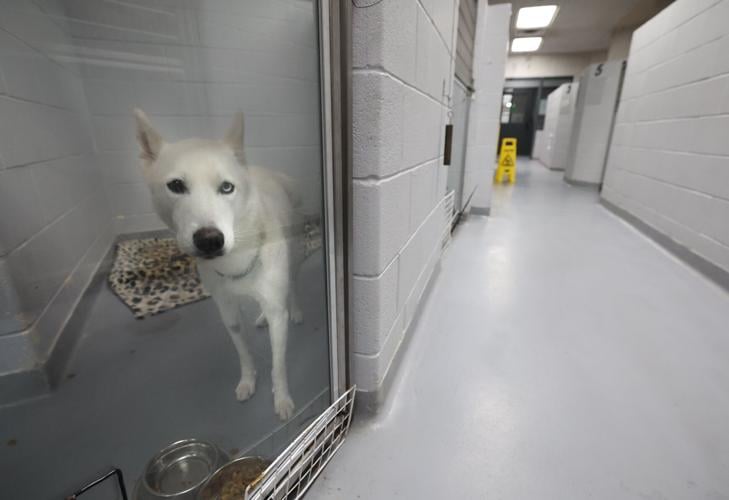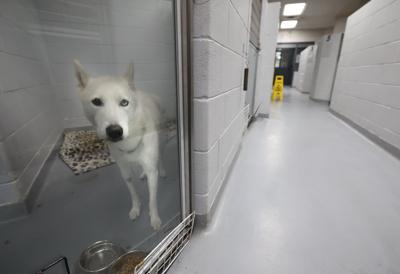Jessica Nichol was working at the ╔ź╔ź└▓ Humane Society during last month’s heat wave when a man arrived at the shelter with his dog.
He┬áhad been living in his car and depending┬áon friends to provide his dog with air conditioning during the day, but it wasnÔÇÖt a reliable or long-term solution.
So, Nichol says, he made the “devastating” decision to surrender the dog to the River Street shelter for the pet’s well-being.
“This person loved this animal very much,” says Nichol, the organization’s senior manager of operations. “It’s clear their bond was very strong. This dog was an emotional support for them during what is a very difficult time in their life.”
Despite the popular belief that it’s “bad owners” who hand over their pets to shelters, it’s difficult scenarios like these┬áthat have┬ápushed people to surrender their pets, says Melissa Shupak, director of animal sheltering.
ÔÇťThey enter the doors of 11 River St. quite distraught at their circumstances and feeling at a loss that they canÔÇÖt even provide something for themselves, let alone their pet,ÔÇŁ she says.
Most often, people who give up their pet do so because they feel they have no other option, she says.
ItÔÇÖs something animal shelter workers┬áare seeing more of.┬á

Volunteer Nil Faulkner┬áspends some quality time with Flynn the rabbit at the ╔ź╔ź└▓ Humane Society on July 30.
Richard Lautens ╔ź╔ź└▓ Star╔ź╔ź└▓ Humane Society has seen a 28 per cent increase in surrenders in the first six months of this year, from 330 in the first half of 2024 to 424 in the first half of 2025, with housing, financial issues and cost of care making up the majority of reasons behind surrenders, according to Shupak.
In 2025 so far, the Ontario SPCA and Humane Society has taken in nearly 3,600 animals across 12 communities. Of those, 59 per cent were surrendered, representing a 16 per cent increase in surrenders compared to last year, the charity said.
And┬áwhile the charity does not track how often the surrenders are due to financial or housing reasons, it knows anecdotally those are factors. Additionally, it has seen the demand for its low-cost veterinary services rise ÔÇťhigher than ever,ÔÇŁ with uptake for basic services last year up 184 per cent.
Shelter operators say they often see people giving up their pets due to unstable or unsafe housing, as well as other financial challenges, high veterinary costs, or petsÔÇÖ┬ábehavioural needs. The shelter may offer resources to the families before taking ownership of the┬ápets, but in many cases, keeping the pet is no longer sustainable, even with the extra help.

Six-year-old retriever-mix Luka sits patiently in his kennel at the ╔ź╔ź└▓ Humane Society on River Street in ╔ź╔ź└▓ on July 30.
Richard Lautens ╔ź╔ź└▓ StarWhen it comes to housing issues, the guardian could be experiencing homelessness, which makes caring for a pet particularly difficult during extreme weather, whether theyÔÇÖre in an encampment in the winter or seeking relief at a cooling centre that doesnÔÇÖt have capacity for pets. Alternatively, they might face rising housing costs that make pet care impossible to afford, or a sudden loss of shelter and an inability to find pet-friendly housing options, they say.
Tenants at the Summerhill used to have two water shutdowns per year. In 2025 alone, there have
In King City, Ont., a 23-pound, five-year-old French Bulldog named Louis was surrendered when his family encountered housing difficulties in November. The nap-loving lapdog is now being fostered, but it could be months before he finds a forever home.
The rescue and animal sanctuary that took him in, Dog Tales, receives about 100 requests to surrender pets per month, according to kennel manager Cassandra Ferrante, although they typically only have the capacity to accept about 10.
Housing instability is ÔÇťone of the most common reasonsÔÇŁ for surrender, Ferrante says, noting people may struggle to find housing that allows pets.
ThatÔÇÖs despite it being “a clear prohibition under the Residential Tenancies Act” for landlords to forbid tenants from having pets in most cases, says Douglas Kwan, director of advocacy at the Advocacy Centre for Tenants Ontario.
Sometimes, renters may feel they have no choice but to accept the landlordÔÇÖs terms because theyÔÇÖre in a tight housing market, he said, but there are few instances in which having a pet could lead to eviction.
Isidoro Ventullo’s eviction captured the sympathy of ╔ź╔ź└▓ residents, many seeing it as
ThatÔÇÖs if having a pet is against the rules for all residents in a condo or co-op, or if the pet could impair the legal right of the landlord, ÔÇťimpair the safetyÔÇŁ of other residents or substantially interfere with other residents’ reasonable enjoyment, Kwan said.
ÔÇťItÔÇÖs a high bar, and something that needs to be proven at the Landlord and Tenant Board,ÔÇŁ he said.
Shelters offer emergency services to prevent surrender
Shelters, before taking ownership of a pet, may offer resources like low-cost veterinary care, food bank programs, emergency foster or boarding programs, or free dog training.
“Our primary focus when folks call us is first to see what we can do to help them keep their pet,”┬ásaid Ontario SPCA and Humane Society vice-president of operations Sonya Reichel.

More people have been surrendering their pets as a last resort, specifically because they’ve lost their housing, have a precarious housing situation, or can’t find pet-friendly housing, shelter workers say.
Richard Lautens ╔ź╔ź└▓ StarThe┬áOntario SPCA and Humane Society , in some cases has food “depots,” and sometimes provides food for communities reaching out directly for support, such as those that have experienced wildfires.
It also offers a for pet parents in need, allowing the animals to stay at a centre for about two weeks or to go into foster care. In that time, the pets receive any veterinary care they might need, such as vaccines, flee treatments or spay or neuter surgery if agreed upon, Reichel said.
The new bylaw aims to prevent landlords from evicting tenants for renovations in bad faith. 
Additionally, it offers three high-volume , which also offer basic veterinary care services at reduced rates. 
╔ź╔ź└▓ Humane Society, meanwhile, offers an to place pets in foster homes for up to six months while the pet guardian finds stability. Shupak says this plays┬áa “vital role” in diverting people from surrendering their pets so they have time to find their footing┬ábefore deciding to give up their pet.
It also offers ÔÇö such as wellness appointments, low-cost spay/neuters and dental services ÔÇö as well as , which are “critical” to keeping pets together, she says.
Shupak, for her part, is grateful pet owners make the decision to turn to ╔ź╔ź└▓ Humane Society for support.
“We try to be as non-judgmental and compassionate in the work that weÔÇÖre doing because we recognize that humans are a part of the work.”



































To join the conversation set a first and last name in your user profile.
Sign in or register for free to join the Conversation